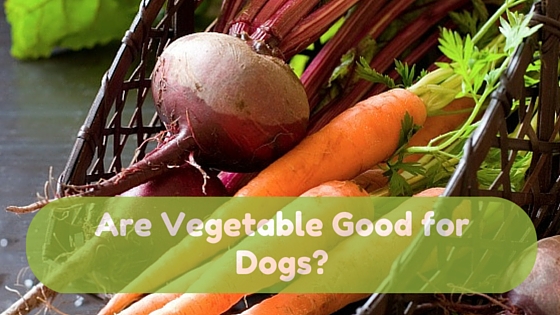Can Dogs Benefit from eating Vegetables?
We all know that vegetables contain an abundant amount of nutrients including vitamins and minerals, antioxidants, phytonutrients, and other health promoting compounds.
Mother has always told us we need to eat our vegetables. Without much scientific evidence, it was always understood that vegetables needed to be part of our diet in order for us to be healthy. In recent years there has been increased focus on the power of natural foods, and more people are taking additional steps to improve and maintain their health. And they’re doing it by making healthier choices when it comes to their diet and by eating more vegetables. Many are also searching for healthier choices when it comes to feeding their pets, and also incorporate vegetables in their dogs’ diet – but do they really benefit our canine friends too?
Whether dogs can really benefit from vegetables in their diet has been an ongoing argument, specifically amongst enthusiastic raw feeders, because commercially fed dogs have been eating a grain and vegetation-based diet for a long time. But even amongst raw feeders there are different beliefs. Some believe that vegetables belong in their dog’s diet because dogs are domesticated and are used to eating a variety of different foods. Other raw feeders however, argue that dogs are true carnivores and have no need for plant matter and that it isn’t biologically appropriate.
Are Dogs Carnivores or Omnivores?
There are different opinions whether dogs are carnivores or omnivores. The reason this argument ties into the same topic whether dogs can benefit from eating vegetables, is because carnivores and omnivores are equipped differently and digest food differently. There are many different beliefs amongst pet owners and I believe whether people think vegetables are good for their dogs or not, has much to do with whether they believe dogs are carnivores or omnivores.
Animals that eat a variety of different foods, of both animal and plant origin are considered omnivores. Humans are considered omnivores. Animals that consume only meat are considered carnivores.
Since dogs have evolved over time and have adapted to their environment, let’s look at their unique physical features:
Teeth
While omnivores have teeth suitable for handling a variety of foods including vegetables, most carnivores have long, sharp teeth adapted to ripping, tearing or cutting meat, bones, organs and hide. They lack flat molars, which are used for grinding and breaking down plant matter.
Gastrointestinal System
Vegetables are much harder for dogs to digest than meat because they contain cellulose. Not only do dogs not have the proper teeth for grinding and breaking down plant matter, dogs are also lacking the digestive enzymes necessary to break down the cellulose, making it impossible for them to digest this carbohydrate.
Carnivores lack salivary amylase, the enzyme necessary for beginning the break down of carbohydrates before they enter the stomach. Omnivores produce amylase in their salivary glands, but carnivores do not. Carnivores also lack the specific bacteria that aids in the break down of cellulose. Because of the difference in their gastrointestinal system, dogs cannot properly break down and assimilate the nutrients from vegetables before they are digested and expelled from the body.
I am sure many of you have fed your dog raw carrots before, but have you looked at their poop afterwards? If you take a close look, you will see that the carrot pieces come out the same way your dog swallowed them. This first became evident to me well over 10 years ago when after a heavy rainstorm I saw a lot of orange looking piles in our yard. The poop had flushed away, and exposed the pieces of carrots – undigested.
GI Tract
After proper break down of vegetables, fermentation is also needed for proper digestion. The GI tract of an omnivore is longer to accommodate the fermentation times required when digesting vegetables. Carnivores have a short GI tract, and therefore food passes through the digestive system quickly. Because of the short GI tract, the vegetables are expelled quickly before they can be fully digested and the vitamins and minerals can be absorbed.
According to Dr. Wouter Hendriks of Utrecht University’s Veterinary School in the Netherlands, when looking at the unique physical features, the dog is undeniably a true carnivore. The dog just happens to have an adaptive metabolism as a result of living with humans for millennia. That’s why the dog is perfectly capable of eating a plant and grain-based diet, as most commercially fed dogs do – allowing them to cope with life as an omnivore.
Olewo Vegetables are EASY To DIGEST
While the question if dogs can benefit from eating vegetables may remain an ongoing argument, and people will always have different opinions, our customers are positively answering this question every day.
Our customers now know that there is an issue with dogs not being able to properly digest vegetables in their raw form and therefore, their dogs won’t be able to receive the health benefits.
With adding Olewo vegetables to their dog’s meals, our customers are seeing definite improvements in their dog’s overall health, often within just a short amount of time. In addition, they are also seeing common ailments like diarrhea and other digestive issues, dull coat, allergies, and itching being resolved – simply by adding a spoonful of Olewo to their dog’s meals every day. Many have been able to discontinue prescription medications and steroid shots, and can’t help but call it a miracle. Amazing what a difference of a little added natural, whole food nutrition can make!
Olewo Vegetables are especially prepared and in the correct form allowing dogs to absorb and utilize the amazing nutrition to benefit their health.
Simply rehydrate Olewo Carrots and Olewo Red Beets and add to your dog’s food, whether it is kibble, canned, raw, or home cooked dog food.


